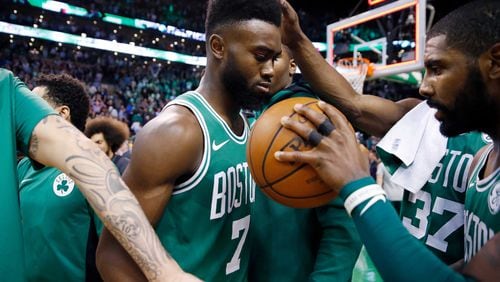The Boston Celtics’ Jaylen Brown endured repeated racist taunts when he was a young player in Georgia, he said this week. It’s not clear, however, whether the incidents Brown described took place at Wheeler High School in Marietta, where Brown emerged just a few years ago as one of the top basketball players in the nation.
The Celtics are in London for a regular-season game against Philadelphia on Thursday. The Guardian newspaper interviewed Brown at length about basketball, politics, the American legacy of racism, and his experiences growing up in Marietta.
“Racism definitely still exists in the South,” he told the Guardian. “I’ve experienced it through basketball. I’ve had people call me the n-word. I’ve had people come to basketball games dressed in monkey suits with a jersey on. I’ve had people paint their face black at my games. I’ve had people throw bananas in the stands.”
Brown, who graduated from Wheeler High in 2015, didn’t specify during the interview whether these episodes occurred when he was playing for the Marietta school.
Wheeler officials said Wednesday that would be a surprise to them.
“We have no knowledge of anything like that ever happening at one of our games,” Cobb County School District spokesman John Stafford said. “We would have never let anybody in the gym if they had shown up with a monkey suit on.”
Stafford said incidents could have taken place outside of the high school, such as with elite traveling teams.
Brown told the Guardian that racism in the U.S. may be harder to see, but it hasn't disappeared.
“Racism definitely exists across America today,” he said. “Of course it’s changed a lot – and my opportunities are far greater than they would have been 50 years ago. So some people think racism has dissipated or no longer exists. But it’s hidden in more strategic places. You have less people coming to your face and telling you certain things. But [Donald] Trump has made it a lot more acceptable for racists to speak their minds.”
Staff writer Vanessa McCray contributed reporting to this article.






